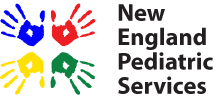New England Pediatric Services (NEPS) is a private, multi-disciplinary, pediatric therapy clinic in Bedford, New Hampshire.
We are passionate about providing developmental and evidence-based services using a “whole child” philosophy while working closely with the families we serve.
Our address is 30 Harvey Road, Bedford, New Hampshire 03110
Our mission to help is simple:
Provide superior speech/language, occupational and physical therapies to help children reach their full potential.
Strive to improve each child’s quality of life by providing highly effective and creative therapy customized to meet each individual’s needs.
Provide evidence based therapy which incorporates cutting edge techniques in order to promote maximum results for children and their families.
Our Areas of Specialty:
Autism is characterized by developmental differences in communication, social interaction, and interests and behaviors. Autism is an array of characteristics and each autistic individual has a unique mixture of traits.
At New England Pediatric Services, we are proud to be allistic allies to the children and families we work with and the greater autistic community. We pride ourselves on being neurodiversity-affirming providers, who embrace and provide neurodiversity-affirming services. We utilize strength-based and relationship-based principles to guide our therapeutic approach.
Selective mutism is an anxiety-based disorder that causes individuals not to speak in specific settings or with specific listeners despite the ability to speak when they are with comfortable listeners.
If it is left untreated, selective mutism can severely impact a child’s development and education. SM is typically best supported by a team approach and active parent and school involvement. To learn more, visit our page on Teaming up on Selective Mutism: a relationship-based treatment model and www.selectivemutism.org.
An Articulation Disorder involves difficulty forming sounds correctly. Young children often make speech errors, for instance, many young children will use a “w” sound in place of an “r” sound (e.g., “wabbit” for “rabbit”). The child may have an articulation disorder if these errors continue past the expected age.
Contact us to schedule an articulation assessment or free screening. Visit www.asha.org for more information on appropriate sound development.
Language Disorders are disorders that involve the processing of linguistic information. Problems that may be experienced can involve syntax and/or morphology (grammar), semantics (meaning), pragmatics (social) or other aspects of language.
These problems may be receptive (involving impaired language comprehension), expressive (involving language production), or a combination of both. Examples include specific language impairment and aphasia, among others.
Language disorders may affect both spoken and written language and can dramatically impact a child’s life. To schedule a comprehensive assessment or free screening, please contact us.
Physical Therapy is intended to habilitate, or rehabilitate, physical impairments and promote mobility, function, and quality of life through examination, diagnosis, and physical intervention.
Areas of expertise within our practice include treatment of developmental delays, high-risk infants, Torticollis, Cerebral Palsy, Autism Spectrum Disorders, Down Syndrome, Spina Bifida, Hypotonia, pediatric orthopedic conditions, medically fragile clients, disturbances of coordination, balance or gait, and orthotic and adaptive equipment evaluations.
Occupational Therapy is the use of assessment and treatment to develop, recover, or maintain the skills needed for activities of daily living. Occupational Therapy interventions focus on adapting the environment, modifying the task, teaching the skill, and educating the client/family in order to increase participation and performance.
Areas of expertise within our practice include fine motor development, motor planning, sensory integration, handwriting, feeding, and self-regulation.
Children with sensory integration disorders experience problems with their sense of touch, smell, hearing, taste and/or sight. Along with these, children can have difficulties in movement, coordination and sensing where one’s body is in a given space, gravitational insecurity.
Sensory integration disorders are prevalent for children who have neurological differences, such as autism spectrum disorder.

